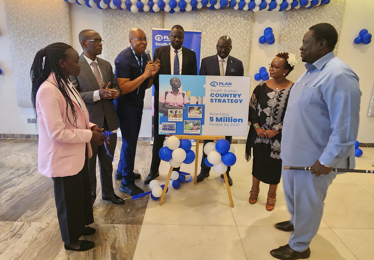International humanitarian agency Plan International on Wednesday launched a five-year USD 135 million strategy aimed at promoting transformative change for children, adolescent girls, and youth in South Sudan.
The strategy is centred on inclusive quality education, protection from violence, youth leadership and economic empowerment, and core humanitarian scale-up, including cross-border programs, health, nutrition, WASH, Food security and livelihood, and disaster risk management.
Speaking during the launch in Juba, Angela Muriithi, Plan International’s Director for Sub-Region, Middle East, North Africa and the Horn of Africa, said they are reaffirming a collective vision for South Sudan where children, adolescent girls and youths are not merely beneficiaries but active agents of transformative change, shaping their lives for the betterment of their community and their countries.
“Imagine a young girl in South Sudan with a dream of becoming a doctor. Many thousands of girls have dreams of excelling in life, but they face immense barriers. Approximately 2.8 million children are out of school in South Sudan due to insufficient resources, conflict, and the impacts of climate change,” Muriithi said. “There are 3.1 million children needing protection services. They worry if they will be married off before they turn 18, and this is the phase that can destroy their dreams. Child marriage is a dream killer for girls, and even if by some chance they can attend school, they face limited opportunities to find jobs or start their own business.”
“Despite these challenges, they are resilient, ready to work hard to stand up to step up to redefine their future, and we see this spirit among young people across South Sudan. The question is, are we ready to stand with them and support them?” she added.
Muriithi said the new country strategy from Plan International is more than a document, but a commitment, and a promise to place the right voices and aspirations of children, girls, and young people at the heart of everything
“We are amplifying key advocacy priorities, girls education, ending child marriages, youths as ambassadors for peace, these are all critical element in breaking cycles of inequality and fostering long term change, the world in changing, almost beyond comprehension, cuts to humanitarian and development aid, over 30 percent of our sector funds have been cut and this is creating size shift and immense challenges for us at a time when humanitarian crises are increasing exponentially,” she said.
For his part, Paul Lusato, Interim Country Director for Plan International South Sudan, said the country strategy 2025 to 2030 is expected to cost a funding of 135 million U.S dollars through collaboration with donors and supporters.
“We have been here working collaboratively with the government and also with communities and other international agencies. The main challenge for this country is that there has been a protracted crisis which affected humanitarian operations,” he said. “So, we think in the next five years we will continue to work with the government, communities, national and international agencies while also getting support from our funders and supporters to focus on the priorities which we have identified so that we can have a better South Sudan where every child has a right to survive in life.”
Lusato said the strategy is targeting 5 million people in five states, including Eastern Equatoria, Central Equatoria, Unity, Jonglei, Greater Pibor Administrative Area, and also in the course of five years, scaling up to Northern Bahr el Ghazal State.
Meanwhile, Hussein Abdel Bagi Akol, the Minister of Agriculture and Food Security, said that the strategy on ensuring the safety, dignity, and empowerment of children and youth with a focus on ending harmful practices, helping young people assess economic opportunities, will contribute to national development.
“As the Minister of Agriculture and Food Security, I particularly value the focus on livelihoods and resilience, which aligns closely with our efforts to improve food security, enhance rural development, and empower communities to achieve food and nutrition security,” he said. “Plan International should continue to focus its intervention in the targeted states, which remain flexible to respond to emerging needs in the other areas.”
“It is paramount that the government supports this strategy to prioritise children, youth, and particularly girls and young women, including those affected by conflict, displacement, and poverty. These are the very groups who hold the key to our future prosperity and peace,” he stressed.




